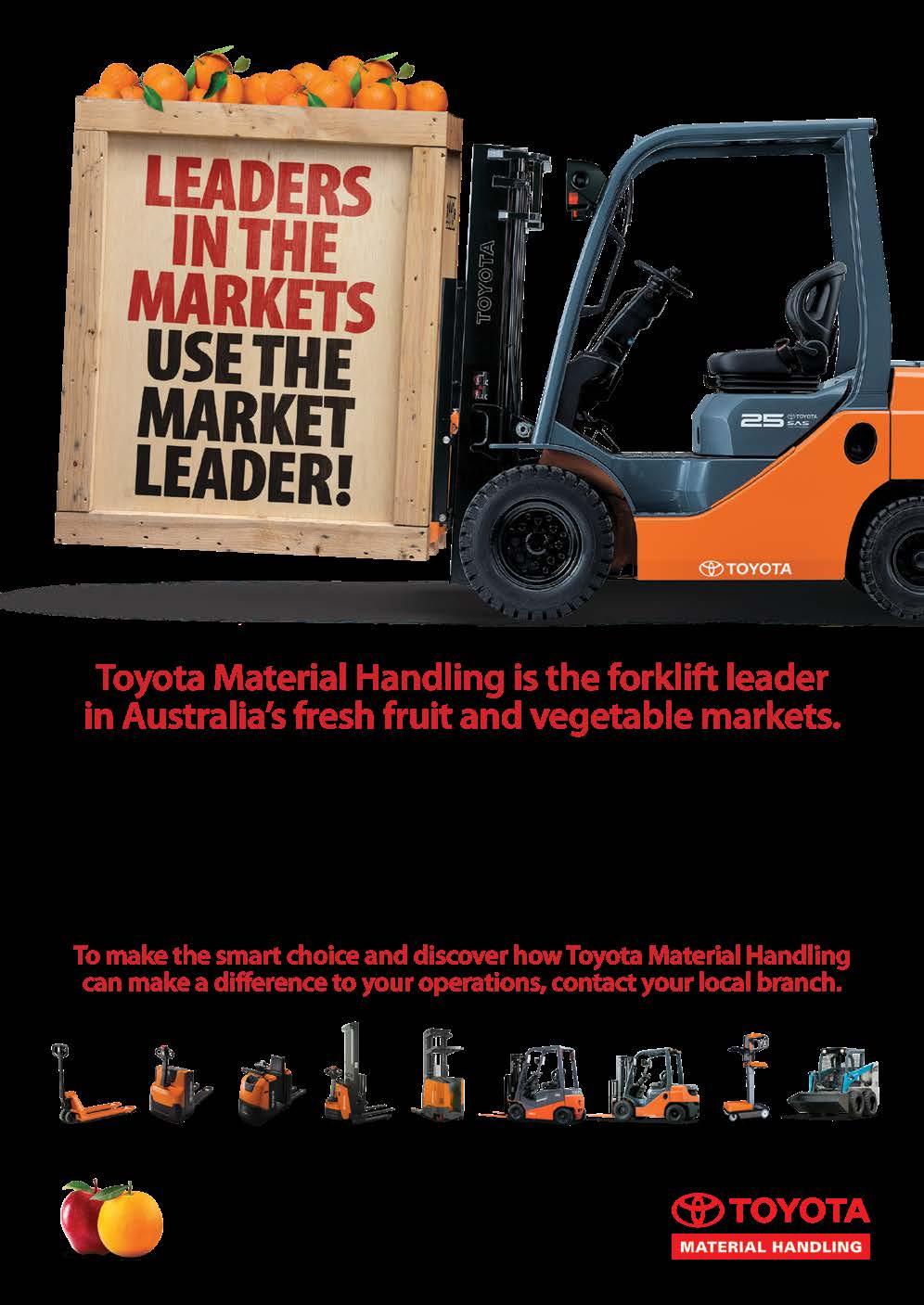The State Government back to their old tricks
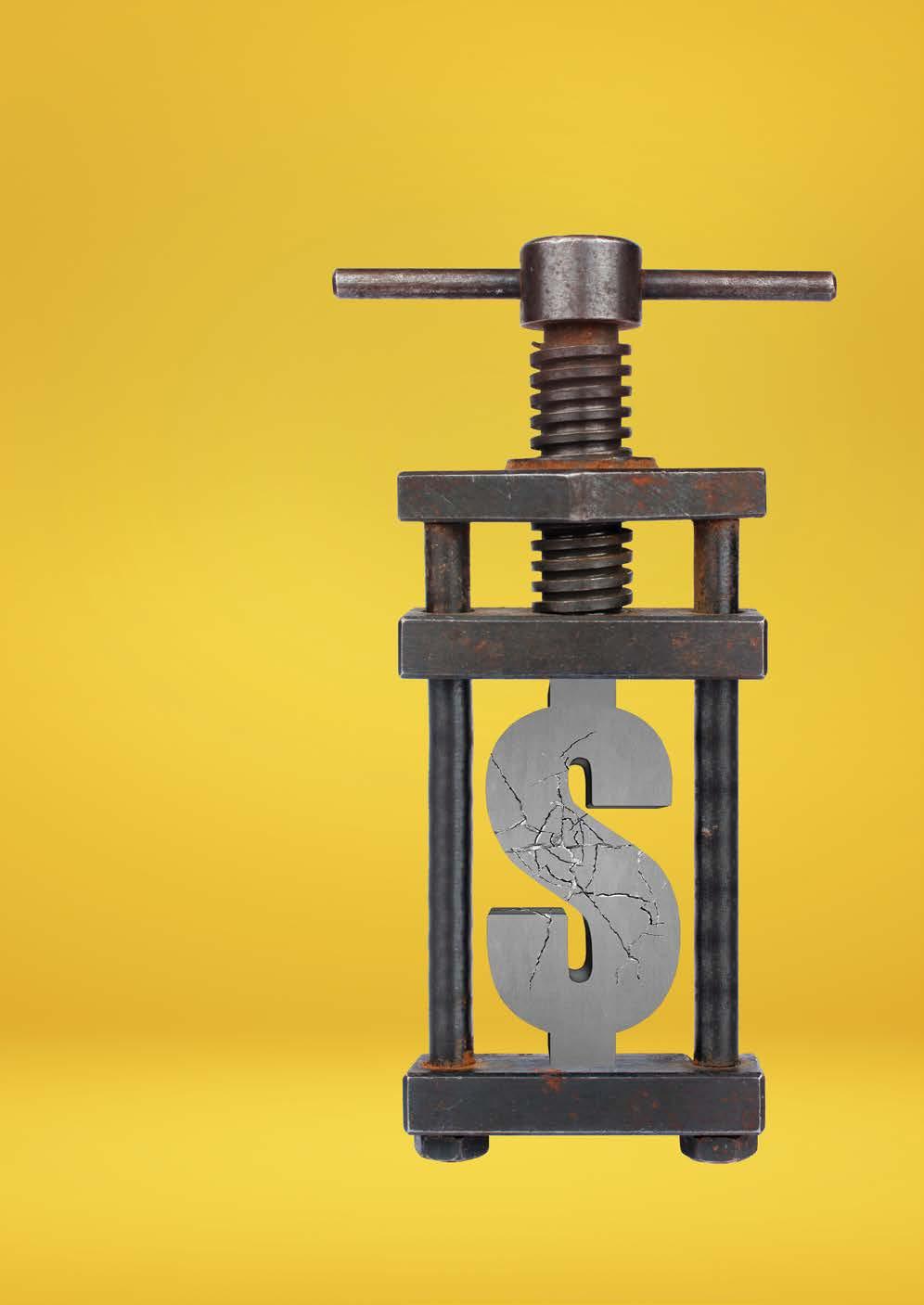
Bushfires cause a sombre start to the year
Big things to come for A Better Choice
Exports rise in value, volume
ISSUE 51 FEB 2020
of affairs
4 — The State Government back to their old tricks
Rising costs predicted at the market.
6 — A Lunch that goes a long way
Donated fruit and veg goes a long way for the families at the Ronald McDonald house.
7 — Exports rise in value, volume
The 2018/19 trade figures are now in and the results speak for themselves.
8 — Big things to come for A Better Choice
Check out all the huge things happening with A Better Choice!
11 — Where are all the bees?
Over half of the bee population has been lost in the recent SA Fires.
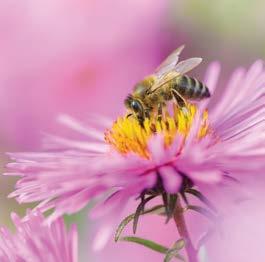
12 — Around the market
14 — Seesaw Cherry Season
An up and down weather pattern causes headaches in this year’s cherry season.
16 — Bushfires cause a sombre start to the year
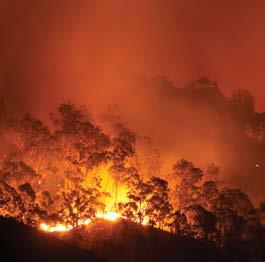
More than 10 million hectares have burnt across Australia.
18 — Christmas BBQ
Check out some photos from last year’s Christmas BBQ.
Published By:
W: freshstate.com.au
P: (03) 9408 6627
CEO: Jason Cooper jason@freshstate.com.au
Editor/Advertising: Dee Sherry dee@freshstate.com.au
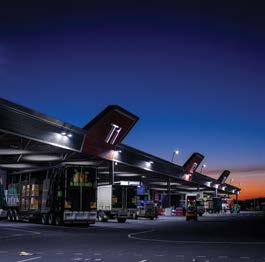
Photography: Dee Sherry
Design & Print:
Distribution: Fresh State of Affairs is produced by Fresh State Ltd. and is a free publication.
2 ISSUE 51 FEB 2020 Contents 11 04 16
19 — Recipe
Fish Tacos with Fresh Mango Salsa.

20 — Drugs and alcohol in the workplace.
Are you in control?
Here from Director of FC Business Solutions, Corina Vucic about drugs and alcohol in the workplace.
23 — Calendar of Events
13th of March — Melbourne Market charity Golf Day
10th of April — Good Friday (Public Holiday)
12th of April — Easter Sunday
13th of April — Easter Monday (Public Holiday)
President’s Message
What a hot and heavy start to the new year we've had. On behalf of Fresh State, I hope everyone had a great Christmas and New Year. Already some pressing issues need to be discussed for the start of 2020.
Many events have already taken place since we heralded into the new year. As everybody around the country feels the aftermath of the bushfires, you will read how the fires have affected the Market. Read a 'need to know' article about the rising costs at the Market and how the State Government has gone back to its old tricks. Read how unpredictable Melbourne weather always causes issues with produce and see all the big things to come with A Better Choice in 2020. As always, read up on some great articles about events going on around the Market.
We look forward to coming to you with exciting topics for you to read in 2020. We always appreciate input from our members and the community on ways to improve. If you have any feedback or issues you would like to discuss; please let us know.
Shane Schnitzler President Fresh State Ltd.

3 ISSUE 51 FEB 2020
19
The State Government back to their old tricks
Once again, the state government has gone back to its old tricks with continual rising costs at the market. After careful review, Fresh State has investigated the trend of produce prices within the last four years, and the results aren’t in favour of tenants.
Increasing costs in 2020 have put a bitter mood on the start of the year. Out of many rising costs here at the market, the main concerns can be seen in the never seen before land tax being introduced, rent, with the same amount of certainty, that night turns into day will increase again in August and the fiveyear honeymoon period on council rates and taxes will reach an end this year, so be prepared for yet another added cost to your business.
The Melbourne Market Authority has recently announced an outstanding land tax bill of $1.9 million dollars in tax, which was owed from the tenants. While the MMA should be congratulated for successfully having the arrears wiped by the State Revenue Office, the more pressing issue is how the new charge will be implemented moving forward. It’s yet another example of how the Victorian State Government has lost touch with the needs of their tenants at the Melbourne Markets.
Rent is a whole other issue. After February 2019, we saw a 2.5% increase to the 3-year, 3.5-year, and 5-year rent contracts. However, in August 2019, the tenants holding a 3.5-year rent contract saw an additional 2.5% increase, making their rates higher than the others. Despite the odd differences in charges and no comment from the MMA about the matter, another increase to the rents is set to occur in August 2020 at the expiry of the current 5-year leases.
During Fresh States investigation, we found that prices for produce have not increased in the last four years, which means that wholesalers have absorbed the ever-increasing costs over that period. This adds another stress to the increasing rents, as the balance between profit and expenses is out of line and
makes it harder and harder for tenants to keep up with costs. Other commercial businesses in this scenario could simply increase their price to compensate for these types of increases. This industry is unique, and unfortunately what the government fails to understand is that many of our biggest customers can simply source their produce from other markets that operate on a lower-cost model, or worst still, go direct and cut the central market out altogether.
The five-year honeymoon period on council rate and taxes has now finished, ultimately meaning another cost to the business. While not unexpected, if this was the only new cost that a business had to deal with, then in many cases, it wouldn’t be a major issue. However, this is not the reality of life in the Melbourne Markets.
Within the Melbourne Market Authority Act 1977, the Objects of the Authority states that the role of the MMA is:
— to provide a commercially viable wholesale facility for the efficient distribution of fresh produce; and
— to optimise returns on land and assets controlled and managed by the Authority; and
— to ensure a fair and competitive environment for the wholesale trading of produce.
With the current situation in costs at the market, it's hard to see how the MMA is following these statements. While they certainly couldn’t be accused of not following the second point, which is to optimise the return on land and assets, it’s difficult to understand how the increasing costs, much of which is in their control addresses the other two points.
ISSUE 51 FEB 2020 4
There will be a point where businesses can’t absorb any more cost increases, making them commercially unviable. We have already seen many instances of smaller businesses being absorbed by bigger businesses. Is this the business model that the State Government wants moving forward. If they do, then their actions align perfectly with this strategy. Not only are they adding extra expenses to the tenants, but they also have not yet completed the review, which was requested earlier last year. Fresh State is waiting with baited breath to see what this review recommends. All that we can hope is that the ‘independent’ review is truly independent and doesn’t simply white-wash the issues that are obvious to everyone that operates a business in the Melbourne Markets, other than the people that make the decisions over these ongoing cost increases.
While all of this is going on around us, it’s worth noting that the Melbourne Market Authority recently released their Annual Report for 2018-2019. While the tenants are struggling to manage their businesses in an environment of continually rising costs, the MMA proudly announced a profit of over $4 million, before income tax and depreciation. Perhaps they have misunderstood the objects of their own act. While they’re certainly optimising their returns on behalf of the government, they’re certainly not providing a ‘commercially viable wholesale facility’ for their tenants. Surely it’s time for the government to think about putting the future of the industry ahead of their own self-interest of increasing revenue, at the expense of wholesaler and all market users sustainability. Take a look at the graph below which shows the trends in Produce Prices vs CPI vs Rent, from January 2016 to October 2019.
Produce Price —VS— CPI —VS— Rents
ISSUE 51 FEB 2020 5
Jan 2016 Jan 2017 Jan 2018 Jan 2019 Feb Feb Feb Feb Mar Mar Mar Mar Apr Apr Apr Apr May May May May Jun Jun Jun Jun Jul Jul Jul Jul Aug Aug Aug Aug Sep Sep Sep Sep Oct Oct Oct Oct Nov Nov Nov Dec Dec Dec Rents CPI Produce Price
A lunch that goes a long way
For the families who need to stay at the Ronald McDonald House over the Christmas period, a special Christmas lunch goes a long way.

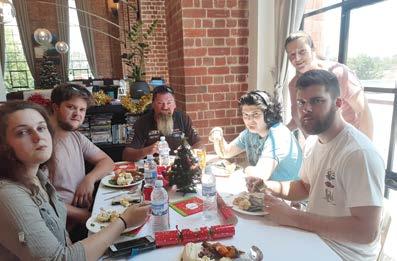
A feast for the families was put on with donated turkey and an assortment of vegetables supplied by businesses from the Melbourne Market. The lunch was an effort to make the day special for those who could not be at home celebrating.
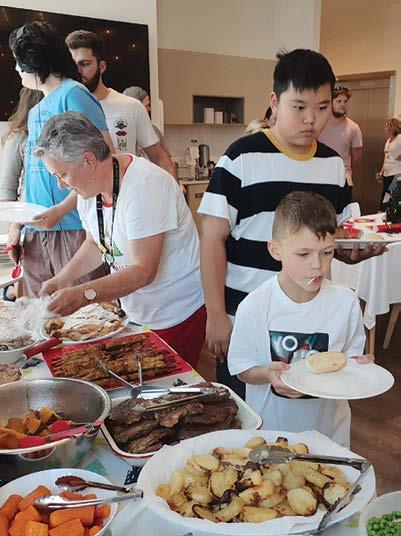
House Manager, Kylie Neve said “the Christmas lunch gives patients one day of normality. When patients and families have to stay at the hospital over the Christmas period, the lunch gives them a feeling of being back at home. We’re not always guaranteed a donation of fruit and veg so it was a great addition to the Christmas table.”
Donating any fruit, vegetables and meat is enormous help to the families at the Ronald McDonald house. “After a day of operations, the last thing parents are thinking about is dinner,” said Kylie.
Thank you to Independent Fresh Produce, Farmers Fresh Produce, Fresh Berry Co., M. & N. Fresh Produce, Prestige Produce and LaManna Premier Group for donating a selection of vegetables to the Ronald McDonald House and making Christmas a special time for all the families.
If you would like to donate, please contact Kylie at kylieneve@rmhc.org.au
6 ISSUE 51 FEB 2020
Exports rise in value, volume
The 2018/19 trade figures are now in and the results speak for themselves. Fresh horticulture exports have exceeded expectations yet again, with the sixth record-breaking year in a row. Fresh fruit and vegetable exports surpassed $1.6 billion, representing a 20% increase in value and 8% improvement in volume from the previous year.
By: Andréa Magiafoglou, CEO, Australian Horticultural Exporters’ and Importers’ Association
Table grapes have been the standout commodity, with over half a billion dollars of fruit exported and achieving the title of the first fruit commodity to reach this mark. Vegetable exports rose a solid 10%, with onions regaining ground and achieving export volumes not seen for several years.
More recently, an excellent season is currently being reported for Queensland mandarins with high quality fruit and strong prices. We expect this will bolster trade export volumes over the coming year for this commodity.
China has maintained its position as the number one trading partner for fresh Australian fruit by both volume and value. Table grapes significantly contributed to this result, however improved pathways for both summerfruit and cherries have helped solidify this trade destination.
For fresh vegetable exports, Singapore took out the top position for value, while carrot exports to United Arab Emirates pushed this market to the number one position for volume.
Half a year has now passed since enhanced air cargo security measures were implemented. Reports coming in from industry members and participants of the Air Cargo Security Advisory Forum (ACSIAF) held earlier this year indicate the transition was smoother than expected with no major impediments with the exception of higher operational costs. Around the Brisbane ports, some stevedore and shipping line problems associated with capacity issues have been experienced, however these are hoped to be addressed prior to next year.
Moving forward, the Australian Horticultural Exporters’ and Importers’ Association is preparing to host industry information-exchange meetings in Brisbane, Sydney and Melbourne Markets for members, exporters and importers alike. More information will be provided on this in due course. We hope to see and hear your views on issues affecting your business.
499,521 t
up to 7.1% from 2017/18
1,393 m
up to 22% from 2017/18
232,991 t
up to 9,9% from 2017/18
298.7 m
up to 13.8% from 2017/18
7 ISSUE 51 FEB 2020
Above: ABS (2019) via ITC Trademap, Fresh Intelligence analysis.
Fresh fruit and vegetable exports — 2018/19
Fresh Fruit
Fresh Vegetables
Big things to come for
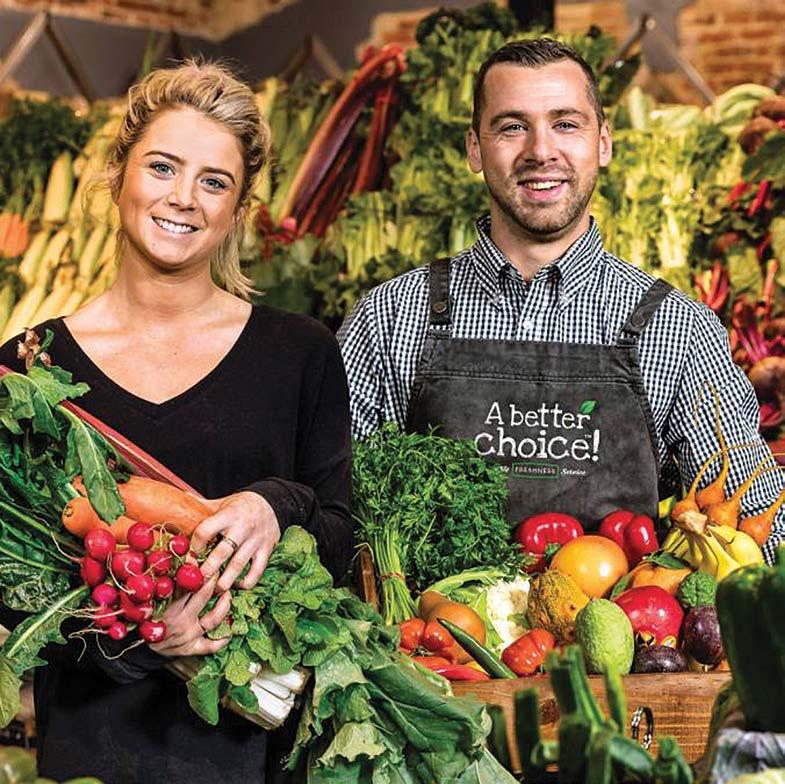
8 ISSUE 51 FEB 2020
A whole lot of work went into the A Better Choice Campaign in 2019. Now already two months into 2020, you can finally see what the months of planning were all about. Over the past year, the A Better Choice Victorian Committee have been working together to get the ball rolling on the first big launch for A Better Choice here in Victoria.

You may be aware that towards the end of 2019, Fresh State and the Melbourne Market Authority worked together on the A Better Choice program, and recruited two retailers and two wholesalers to join the Victorian committee. This committee has full control over the decisions concerning both the directional and financial aspects of the A Better Choice campaign in Victoria and will represent all Victorian retail members of the program. The two retailers who joined the committee are and will work closely with the committee and provide input from a retailer’s perspective to help ensure the overall success of A Better Choice.
In October/November 2019, the Victorian committee met to create an advertising campaign that was to be deployed between January and April across the state. Several platforms were discussed, and the TV commercial was settled on as the way to best engage our audience.
And then came our first big rollout of the A Better Choice TV commercial, which was aired during the Australian Open tennis tournament within January and February, on Channel 9. Over 1000 commercials were aired on the metro and regional TV throughout Victoria.
The campaign aims to encourage the consumer to “go to those who know.” It communicates that your independent greengrocers and independent supermarkets offer the best in service, knowledge, and in fresh produce from wholesalers and growers at the Melbourne Market. Mangoes and tomatoes were the in-season produce featured in the commercial. Filming for the TV commercial took place in the Market on the Buyers’ Walk between the 2nd and 3rd of January. You may have also seen signage rolled out on the Trading Floor and on the Buyers’ Walk that promotes the campaign and profiles of some of our members.
There’s no better time than now to be a part of A Better Choice. Victoria is currently leading the way in Australia, with 176 retail stores signed up.
Our ultimate aim in 2019 and early 2020. was to increase brand awareness of A Better Choice amongst retailers, consumers, and wholesalers.
During October 2019, the National Marketing Guiding Committee met in Melbourne for a strategic workshop. Members of the committee explored the objectives for the program for the next 12 months and beyond. These objectives consisted of targets for the new year and included rolling out a national campaign that will be in the works during February 2020. We have plans to continue our TV commercial campaign into 2020. Victoria is leading the way in plans for our campaign to be rolled out nationally.
As you can see there are big things to come for A Better Choice, so there is no better time than now to be a part of the movement. If you have any feedback or questions about the A Better Choice program, feel free to send an email to abetterchoice@ melbournemarket.com.au
9 ISSUE 51 FEB 2020
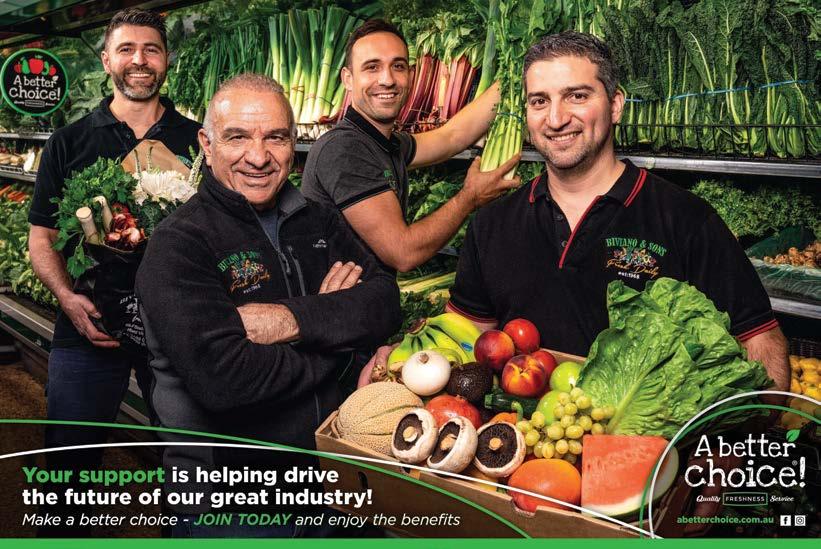
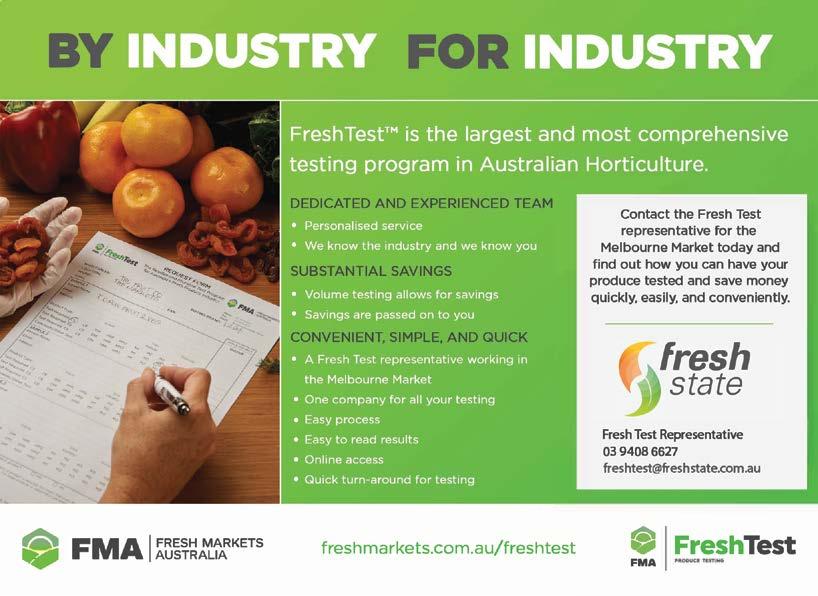
10 ISSUE 51 FEB 2020
Where are all the bees?
After around 2,000 hives were destroyed in the recent SA Fires, over half of the bee population has been lost in that area. With the source of flora significantly low, it’s going to be a while before we see anything buzzing around again.
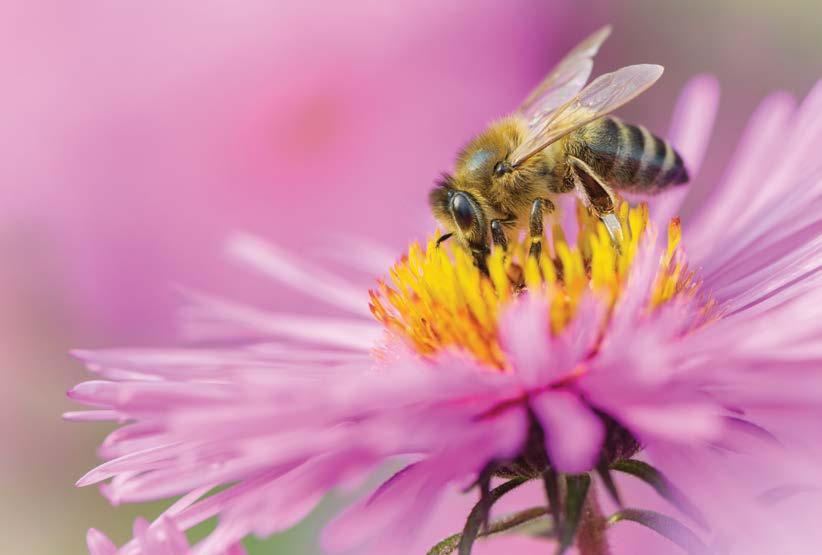
So far, 1,100 hives on Kangaroo Island were lost in the fires, which is home to the last pure strain of Ligurian bees in the world. Over half of the bee population has disappeared and it's going to take a while to breed up the population again, due to the lack of resources available.
A significant impact on the pollination crops was seen in the aftermath, with 210,550 hectares of Flora burnt down on Kangaroo Island, a major hit to the survival of the bees. Though we are seeing more rain as we go further into the year, low rainfall means all sources
of flora will struggle to grow. Not only the flora but native vegetation and trees that were lost can take years to regrow back to what it once was.
A foreseen shortage of honey may fall over Australia due to this devastation. On one of the farms on Kangaroo Island, along with 450 hives, more than 40 tonnes of honey were lost in the fires.
All hope is not lost with some farms obtaining special feeders to put in the hives to keep the bees strong until the area starts flowering again.
11 ISSUE 51 FEB 2020
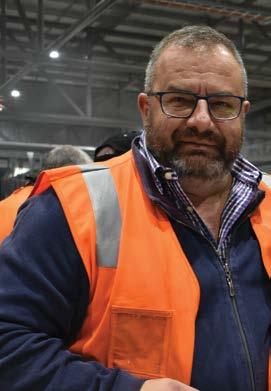
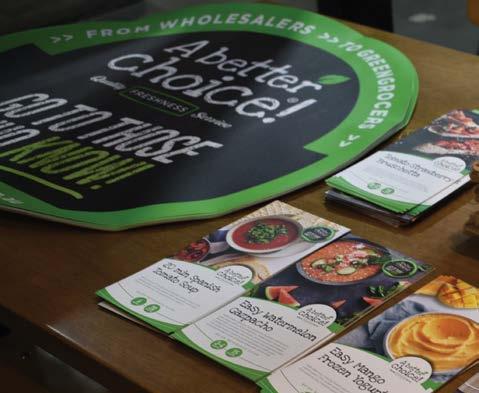
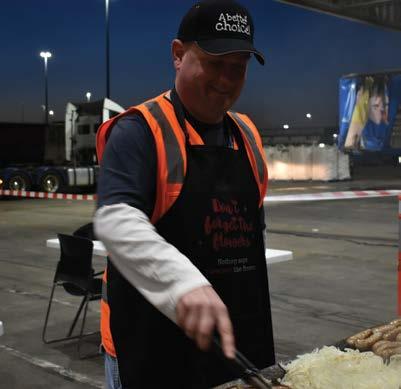
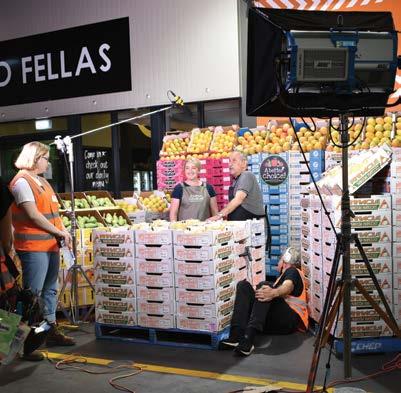
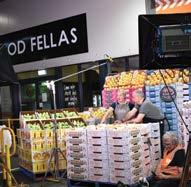
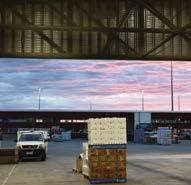

12 ISSUE 51 FEB 2020 Around the Markets 01 Australia Day BBQ 02 A Better Choice Merchandise 03 Mel from DEBRA selling raffle tickets at the Australia Day BBQ and Joe Amalfi 04 Chinese New Year at the Market 01
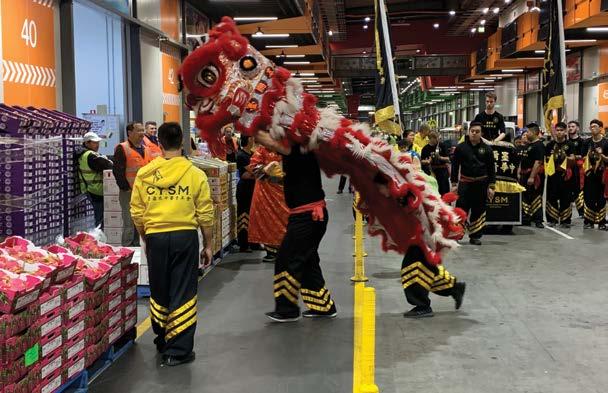
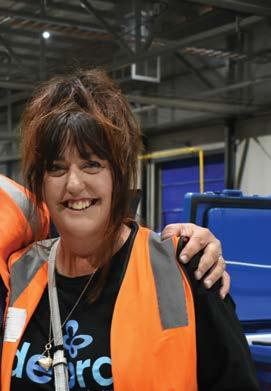
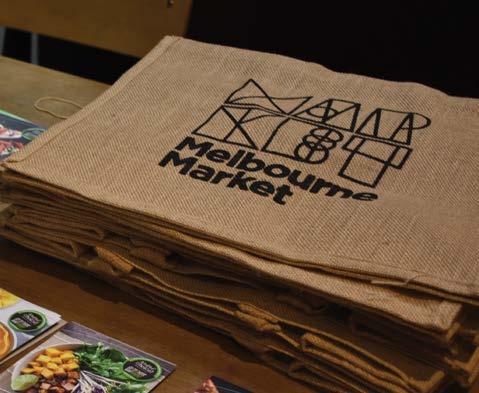
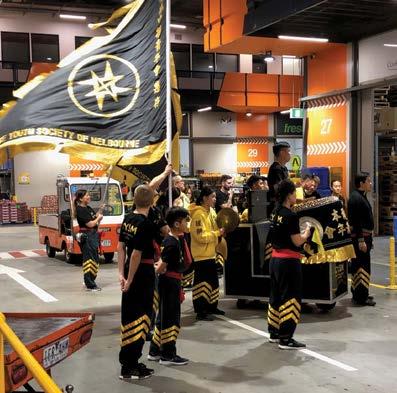
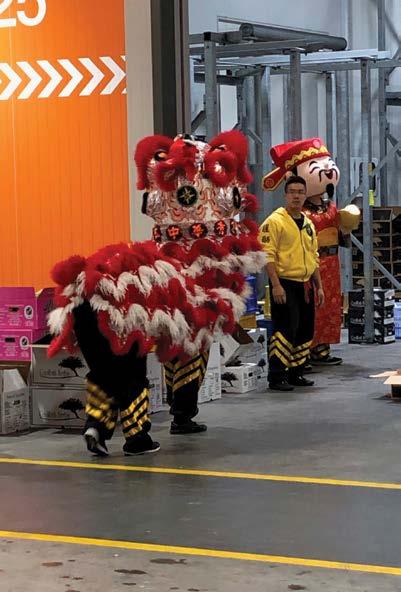
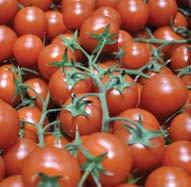
13 ISSUE 51 FEB 2020 03 02 04
Seesaw Cherry Season
A year of rapidly changing weather caused a lot of headaches around this year’s cherry season. Cold conditions in Tasmania and extreme heat in the NSW region caused delays and troubles for consumers wanting their cherries.

With a forecast of a promising season in early 2019, the weather turned not as favourable as most would’ve liked. The cherry harvest around the country was delayed a week to 10 days due to the climate in Tasmania. The lack of sunlight and cool conditions caused a change in the readiness of the cherries during picking time.
Joe Amalfi from Provincia, who has been sourcing cherries from Tasmania for years, said, “this year’s (2019 start) cherry season had a week delay due to low temperatures through the mainland. The weather played a big part as it impacted the quality of the cherries, which created a short supply. With the short supply and high demand for cherries, it caused cherry prices to increase.”
In other parts of Australia, complete opposite weather conditions were being played out. Heatwaves
swept across NSW, causing setbacks for the cherry season. For many of the farms, most scrambled to pick the cherries before temperatures in the 30’s and 40’s hit. In extreme heat, cherries don’t last as well as when they’re picked in cooler weather, so there was a rush to pick the cherries to ensure the quality. Some farms even encouraged buyers to use the ‘pick your own’ system and arrive at 5 am instead of the usual 7 am start. The drought and extreme weather in the NSW region also saw a reduction in the fruit set. Some vineyards had smaller crops, and some had none at all, making it extremely difficult to go into the new season.
Thankfully this was not the case for all businesses. Despite the weather, some were very successful this season but are still wary of the rising temperatures in 2020.
14
ISSUE 51 FEB 2020

15 ISSUE 51 FEB 2020
Bushfires cause a sombre start to the year
Devastatingly, early this year, bushfires ripped through Victoria’s farmland in East Gippsland and the north-east. More than 10 million hectares have burnt across Australia due to this fire season, and as the warm weather seesaws, there is no definitive answer to that number increasing or not.
An estimate of 67,000 people fled from the fires in Victoria, and at least 200 homes have been confirmed destroyed in the bushfires, with the number expected to rise. The fires have burnt through 1.2 million hectares in the states east and north-east, many of those being farms and agricultural areas. The full scale of destruction is yet to be calculated, but we’re sure to find out in the coming months.
Many of the market community were directly affected, with grower’s farms and crops being lost during the fires. One of the suppliers of Flavorite, Pure Gold Pineapples, lost a substantial amount of their farms. The Brooks & Sons Farm in Bungundarra lost some of their pineapple crop, sheds, and farming equipment.
Director at Flavorite, Grant Nichol, says, “The impact has hit hard with some suppliers losing about a third of their crop. It will take about 4 to 5 months to get farms up and running again.”
“The fires caused a number of impacts on the markets as well. Due to the restricted transport to growers close to the bushfire regions, some markets were oversupplied, and some were undersupplied, this ultimately affected the price of the produce and then pushed the market price down.”
Short supply was seen all over the country with little produce going from Adelaide to Perth. Prices rose in some states and plummeted in others, and direct supply from state to state was short.
The Government has pledged to provide $50 million to set up Bushfire Recovery Victoria. Victoria Premier Daniel Andrews said this agency will provide support across the state due to the current crisis and will remain for any future needs. The Agriculture Victoria Relief and Recovery Incident Management Team has been established by the Victorian Government to assist farmers affected by bushfires in East Gippsland and north-east Victoria. Agriculture relief operations will be coordinated for all fires in the Upper Murray and Gippsland regions. The team will also oversee relief in other fire-affected areas for the rest of the summer.
Due to the devastation of the amounts of livestock lost to the fires, 21 private vets will work in the relief centres based in Upper Murray to assist Agriculture Victoria with animal welfare cases. Early 2020 it was estimated that ‘1,150 confirmed livestock losses in the Upper Murray area and 150 in Gippsland across dairy, beef, and sheep — with more than 3,500 animals still reported as missing across both regions.’
Fresh State and the Melbourne Market Authority have set up a bushfire appeal fund to support those who have been affected by the bushfires. So far $34,412.85 has been raised! If you would like to donate to the Melbourne Market bushfire appeal, please visit melbournemarkets.com.au/news-events/ melbourne-market-bushfire-appeal
16 ISSUE 51 FEB 2020
The impact has hit hard…
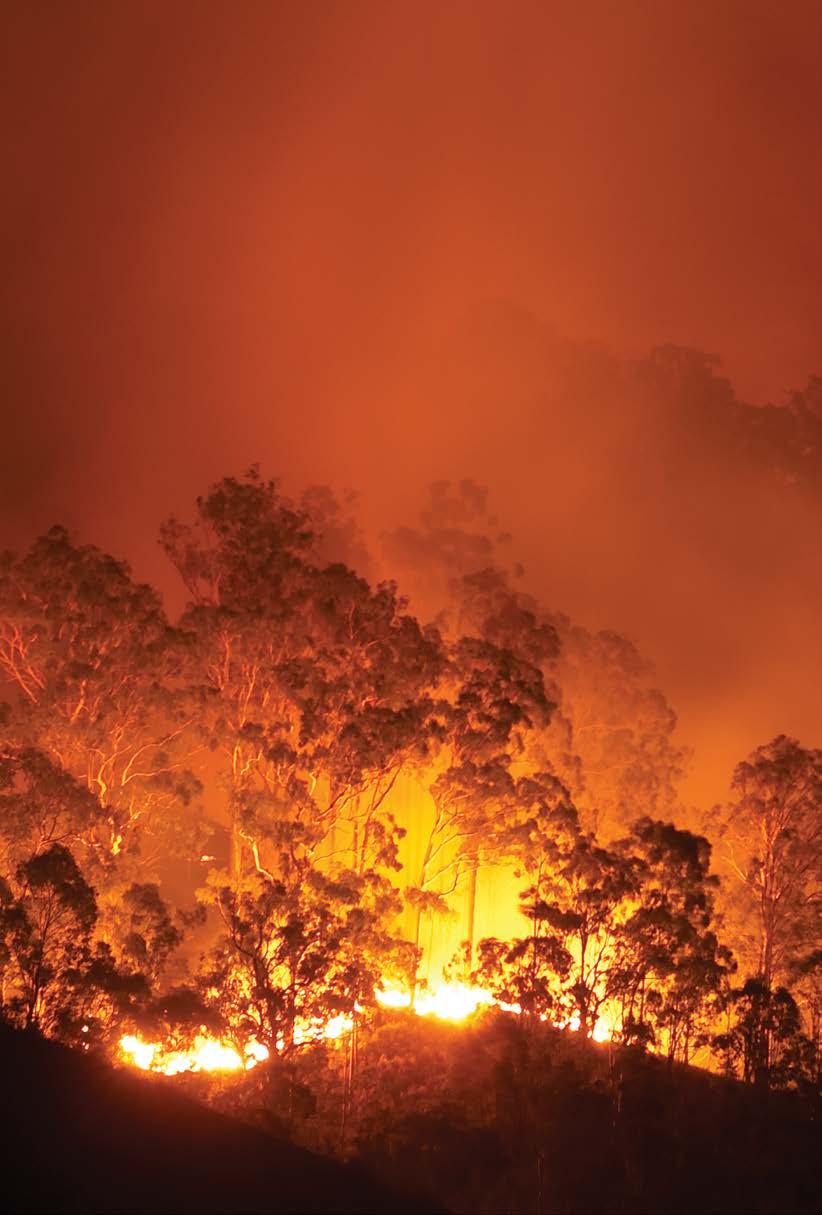
17 ISSUE 51 FEB 2020
Christmas BBQ
As we wrapped up 2019, Fresh State, with the help from Toyota, held their annual Christmas BBQ. It was great to see all our members there, enjoying a sausage or two…or three.
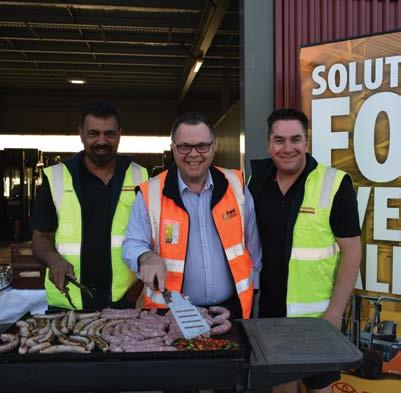
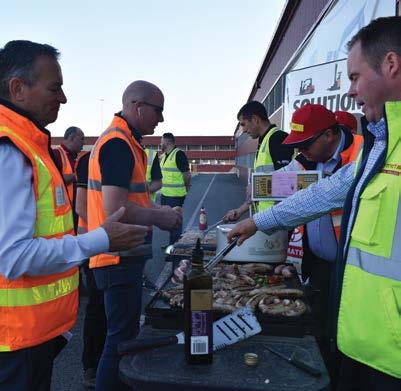
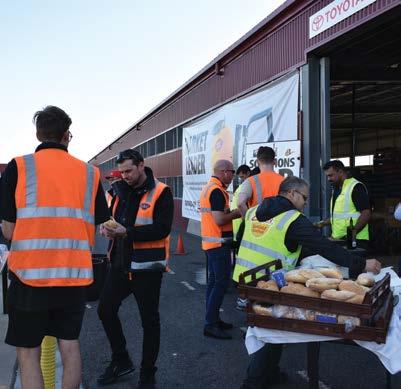
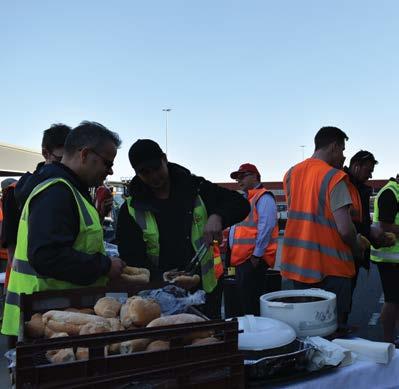
ISSUE 51 FEB 2020 18
Fish Tacos with Fresh Mango Salsa
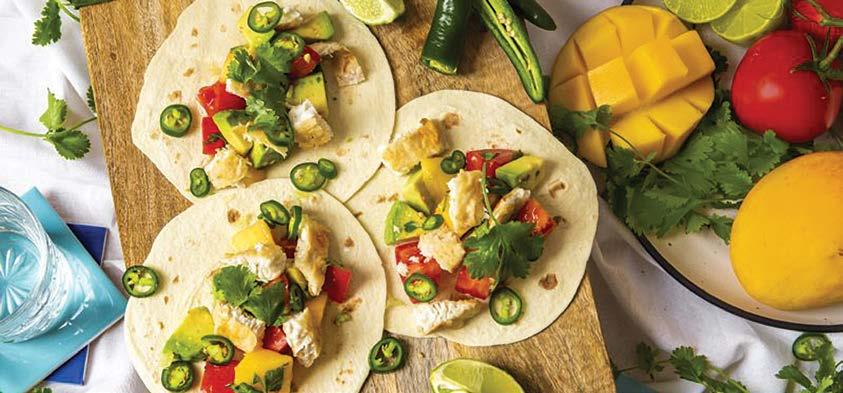
Method
1. To marinade the fish combine all of the ingredients in a mixing bowl except the fish, stir to combine and then add the fish into the marinade and allow to marinade for at least 20 minutes at room temperature. Once marinated grill the fish over a high heat on both sides, once cooked allow to rest for a moment and prepare the remainder of the ingredients.
2. To make the mango salsa, combine the mango, chilli, coriander and the lime juice and stir to combine.
3. To assemble warm the tortillas in a pan over a medium heat until warm, alternatively this can be done in the oven by wrapping the tortillas in aluminium foil and gently heating them until soft and pliable.
4. I normally serve everything individually in separate bowls on the table to allow guests to put them together themselves however if you wish to assemble them it’s a simple process of scattering the cooked fish over the warm tortillas followed by the lettuce, diced tomatoes, coriander and a dollop of the mango salsa.
Ingredients
¡ 600g flat head fillets
Marinade
¡ 1 lime, juiced
¡ 1 tablespoon of extra virgin olive oil
¡ Small handful of coriander, washed, dried and roughly torn
¡ Teaspoon of freshly chopped green chilli
¡ Pinch of salt
Salsa
¡ 1 ripe mango, skin removed and roughly diced
¡ 2 teaspoons of chopped jalapeno chilli (or normal chilli)
¡ 1 handful of coriander, washed, dried and roughly chopped
¡ 2 tablespoons of lime juice
Assembly
¡ 8 corn tortillas
¡ 2 handfuls of shredded lettuce
¡ 2 tomatoes, washed and diced
¡ 2 small handfuls of picked coriander, washed and air dried
19
ISSUE 51 FEB 2020
Drugs and alcohol in the workplace.
Are you in control?
Author: Corina Vucic, Director, FC Business Solutions.
It is blindingly obvious why illegal drugs and alcohol can’t be part of a workplace. The impaired judgement these substances bring can be a physical threat (e.g. operating machinery) and a threat to your business with poor decision making and diminished communication skills. How can you lessen the risk of accidents and, if they do happen, ensure that you have done everything possible from a compliance point of view?
Why do you need a policy on drugs and alcohol in your workplace?
Think about your workplace. Do your employees go out for a “liquid lunch”? Do they party hard on Friday nights and come in over the limit or still buzzed on Saturday morning?
A policy that spells out your position on drugs and alcohol in your workplace is essential to provide you with a safer workplace and legal protection.
When it comes to drugs, what should be covered in the policy?
Illegal drugs, they are just that — illegal — and shouldn’t be tolerated in your workplace.
The use of legal medications should be covered. People need to be able to take drugs to manage medical conditions without discrimination, however with medications that can cause drowsiness (for instance), if the employee’s job entails using machinery, then you need to provide flexibility in the role for the duration of the treatment.
Did you know work parties are considered the “workplace”?
If you have work social events, you, as the employer, are responsible for the behaviour and safety of attendees. Make sure there are non-alcoholic and low-alcoholic drinks readily available, that there is food served and alcohol is served responsibly. Include this information in your policy.
Circulate the policy before the event and advise managers on organising designated drivers, preventing people from driving if impaired and arranging for them to get safely home.
Alcohol and drugs can lead to harassment and violence. Do you have a policy on harassment, bullying and discrimination?
Illegal drugs and excess alcohol at work events are responsible for many sexual harassment and violent incidents but it’s not just social occasions when these behaviours occur. Have a clear policy in place.
How do you get the word out about your policy?
Provide the policy to all employees when it’s introduced and to all new employees when they join you. Have it on your intranet and provide a copy in a staff area. Having a policy that no one knows about will not protect you if you have an accident or incident.
What happens if people ignore the policy?
Your policy should include what happens if there is a breach. While the wording may talk about disciplinary action including termination, you should ensure the punishment fits the crime — e.g. asking offenders for written apologies, restitution or providing advice on where to seek help.
Bottom line
¡ Do you have a drugs and alcohol policy? If no, you are exposed.
¡ Has it been distributed to all employees and is it easily available to them?
¡ Do you have a policy on harassment, discrimination and bullying?
¡ Have you thought about what you will do if people breach your policy?
Help! This sounds too hard
If this sounds too daunting, FC Business Solutions can help you with all the policies you need for your workplace. They can also discuss appropriate penalties and actions for breaches.
Call us on 9533 0028
20 ISSUE 51 FEB 2020
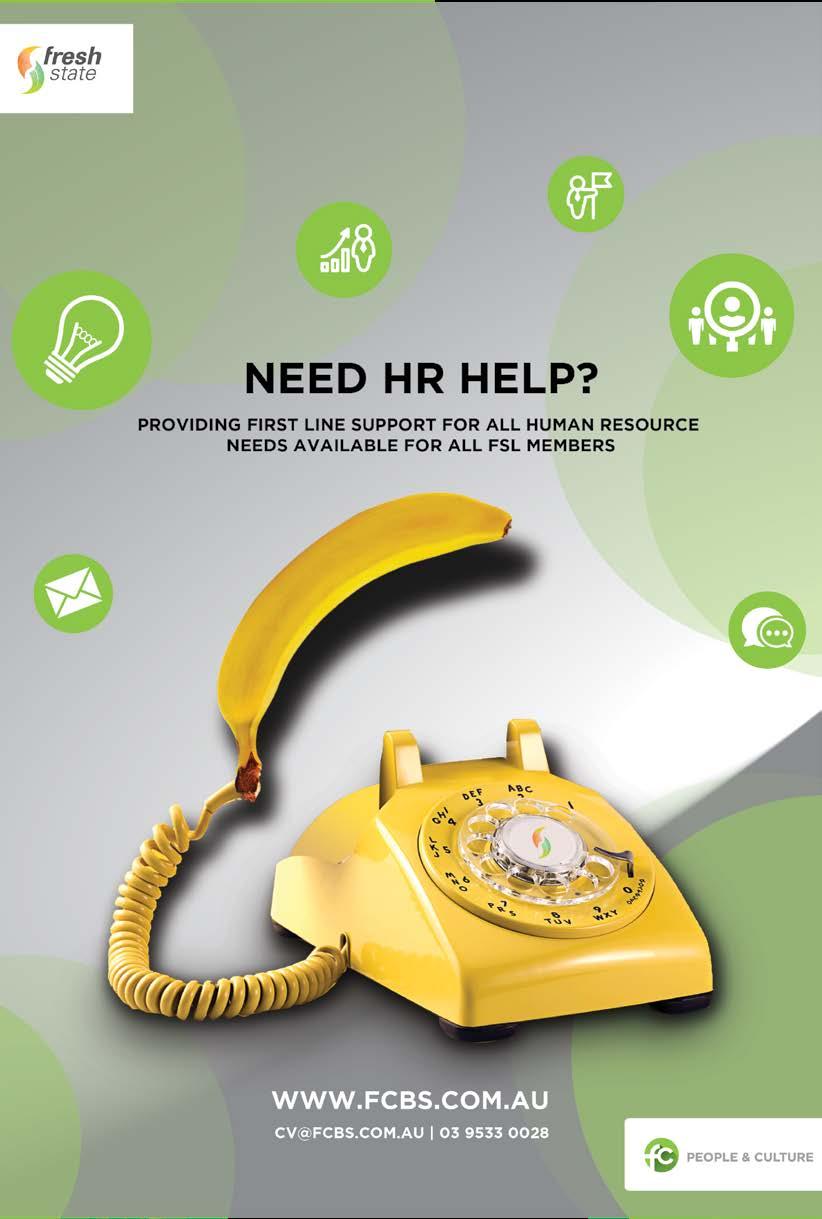
21 ISSUE 51 FEB 2020

22 ISSUE 51 FEB 2020
Calendar of Events
Friday, 10 th of April
— Good Friday (Public Holiday)
Monday, 13th of April
— Easter Monday (Public Holiday)

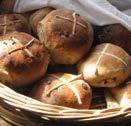

Friday, 13th of March
— Melbourne Market charity Golf Day

Sunday, 12 th of April
— Easter Sunday
Disclaimer
Fresh State Ltd makes this magazine available on the understanding the users exercise their own skill and care with respect to its use. Before relying on, or altering any business practices, users should carefully evaluate the accuracy, completeness and relevance of the information for their purpose and should obtain appropriate professional advice relevant to their particular circumstances. This magazine contains views and recommendations that do not necessarily reflect the views of Fresh State Ltd.
Fresh State does not in any circumstances accept responsibility for the accuracy or suitability or otherwise of any information published in Fresh State of Affairs. Fresh State Ltd specifically disclaims all and any liability for loss or damage of any nature whatsoever and however arising, whether due to accuracy, error or omission or any other cause.
In addition, by using the information in this magazine, each user waives and releases Fresh State, its staff and agents from any and all claims relating to the use of this document. In no event shall Fresh State Ltd be liable for any consequential damages resulting from using the information in Fresh State of Affairs.
© Fresh State Ltd 2019
This work is copyright. Apart from any use as permitted under the Copyright Act 1968, no part may be reproduced by any process without prior permission from Fresh State Ltd. Requests and inquiries concerning reproduction and rights should be addressed to:
The Editor
Fresh State of Affairs Magazine
Store 36, Melbourne Market 35 Produce Drive, Epping, VIC 3076
23 ISSUE 51 FEB 2020
